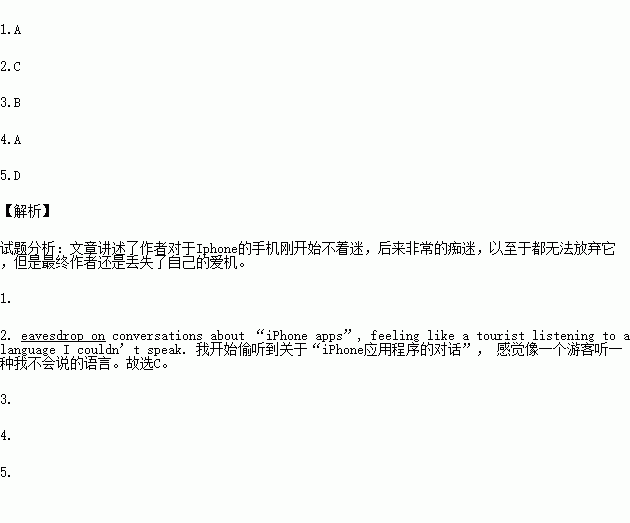题目内容
My name is Amy. I’m a 25-year-old graduate student who likes yoga, home-decorating shows and eating spoonfuls of peanut butter straight from the jar. Oh yeah, and I’m an iPhone addict.
I wasn’t always an addict. In fact, for many years I told myself I didn’t want a fancy cellphone. They seemed like too much work, always ringing and demanding attention. I was perfectly content with my simple cellphone, and I didn’t feel like changing my mind any time.
However, about a year ago, I found myself envious of all those proud iPhone owners, holding their shiny new phones and showing them off to all their friends. I started to eavesdrop on conversations about “iPhone apps”, feeling like a tourist listening to a language I couldn’t speak.
Eventually I couldn’t ignore my iPhone instinct (本能) any longer, and I welcomed my new iPhone into my life. I instantly fell in love with the little bundle of joy, and could no longer imagine a life without it.
To my surprise, I suddenly found myself with a whole new circle of friends—other iPhone owners I could go to for advice and support as I learned the various functions of my new device. They responded to my iPhone-related queries when my other friends couldn’t, and didn’t roll their eyes when I bragged(吹牛)about all the things little Eloise (yes, I named her) could do.
For a couple months I built my new life with Eloise. However, I realized I had a problem when one day I found myself Google-mapping my way to my mailbox, which happens to be right outside my front door.
When I reflected upon the past few months, I couldn’t believe I didn’t see this coming. All the warning signs were there. Eloise slept right beside me and was the first thing I reached for in the morning. I checked my e-mail about 20 times a day. I also experienced attachment anxiety when I left poor Eloise in the changing room at the gym. What if she rang and needed my response? Or, even worse, what if a careless gym-goer knocked her out of my bag and caused her screen to crack?
Once I admitted I had a problem, things started to change. What used to feel like friendly messages now felt like constant complaining to respond. I hated that I could no longer leave the house without Eloise in my hand. Eventually, I felt angry with Eloise so much that I wanted to throw her at the wall.
I decided something had to be done. But, as I quickly realized, iPhones are like cigarettes and not easy to quit.
Then, while taking the bus to work one day, I was unexpectedly forced to quit—at least temporarily. When I reached into my purse to grab Eloise, I found her overcome by fever. My head swam with panic as I attempted to solve the problem, but without result. I couldn’t call anyone for advice. I couldn’t Google whether this had happened to any fellow iPhone owners. The Apple Store was closed by the time I finished work, so I headed home with fear into an Eloise-less night. But, after a couple hours without any text alerts, push notifications, or even good old-fashioned phone calls, I felt ... calmer. Without my electronic bed partner, I drifted off into the deepest sleep I’d had in months. The next morning, I read the news from the simplicity of the newspaper, instead of from my iPhone. I even noticed the cherry blossoms blooming.
My goodness, what had I been missing?
1. The passage is mainly about ___________.
A. how I changed my attitude towards iPhone
B. why I was content with my iPhone
C. how my simple cellphone changed my lifestyle
D. why I preferred to use iPhone eventually
2. The phrase “ eavesdrop on” ( Paragraph 3) is closer in meaning to __________.
A. adapt suddenly to B. join unwillingly in
C. listen secretly to D. argue fiercely in
3.IPhones’__________ can not be listed among the reasons why the writer was addicted to it.
A. diverse application B. excellent service
C. bundle of joy D. good company
4.When did the writer get to know that she had to tear herself away from her iPhone?
A. She needed her iPhone to lead her to the mailbox.
B. She slept with her iPhone beside her every night.
C. She checked and read her e-mails too frequently.
D. She dared not leave her iPhone alone at the gym.
5.What message does the writer pass on at the end of the passage?
A. She considered throwing away her iPhone regretful.
B. She looked forward to starting her new life with Eloise.
C. She thought it of little benefit to have a simple cellphone.
D. She was aware that she had to kick the habit of being addicted to her iPhone.

